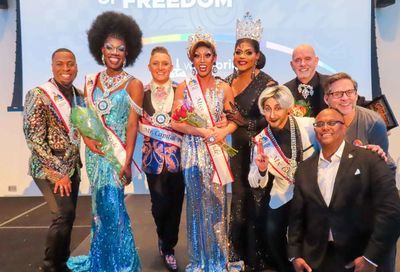BREAKING: DOJ Asks Supreme Court to Take Two DOMA Cases, Maintains Law Is Unconstitutional
[This post was expanded and updated, with the final update made at 8:55 p.m.]
 [Photo: The Supreme Court building. (Photo by Chris Geidner.)]
[Photo: The Supreme Court building. (Photo by Chris Geidner.)]
The Obama administration is squarely taking on the Defense of Marriage Act, asking the U.S. Supreme Court today to review a pair of cases challenging the constitutionality of the federal definition of “marriage” contained in the 1996 law — while continuing to argue the law should be struck down.
In Golinski v. Office of Personnel Management, the California-based case before the U.S. Court of Appeals for the Ninth Circuit, DOJ is asking for the Supreme Court to take the case before the appeals court, which is scheduled to hear oral arguments in the case in September, even decides the case.
DOJ also is asking the Supreme Court to take review of another case, Massachusetts v. Department of Health and Human Services, that was decided by the U.S. Court of Appeals for the First Circuit on May 31. The House Bipartisan Legal Advisory Group, led by the House Republican leadership, had sought review of the case this past Friday, June 29.
In the filings to the Supreme Court, called petitions for a writ of certiorari, Solicitor General Donald Verrilli Jr., the DOJ’s top appellate litigator, argues that a single question is presented by the cases, which the Supreme Court should accept the cases to answer: “Whether Section 3 of DOMA violates the Fifth Amendment’s guarantee of equal protection of the laws as applied to persons of the same sex who are legally married under the laws of their State.”
Unlike the Obama administration, the BLAG filing seeking Supreme Court review in Massachusetts asks a similar question to the one posed by DOJ but also asked the Supreme Court to review whether the First Circuit’s “invented” standard for equal protection review was proper.
Since February 2011, DOJ has stopped defending Section 3 of DOMA, following a determination by President Obama and Attorney General Eric Holder that the law is unconstitutional. In its stead, BLAG has defended the law.
In today’s Supreme Court filings, DOJ continues to take the position that Section 3 of DOMA is unconstitutional and explains its reasons for asking the Supreme Court to hear the cases:
Although the Executive Branch agrees with the district court’s determination in this case that Section 3 is unconstitutional, we respectfully seek this Court’s review so that the question may be authoritatively decided by this Court. As explained above, to ensure that the Judiciary is the final arbiter of Section 3’s constitutionality, the President has instructed Executive departments and agencies to continue to enforce Section 3 until there is a definitive judicial ruling that Section 3 is unconstitutional.
Because DOJ is asking the Supreme Court to take the Golinski case before the Ninth Circuit has ruled, the discretionary action means, for the time being, the Ninth Circuit appeal goes forward. If the Supreme Court declines to take the Golinski appeal, the appeal would continue in the Ninth Circuit. For that reason, DOJ also filed its appellate brief in the Ninth Circuit Golinski appeal today as well.
In a letter to the Ninth Circuit clerk explaining today’s filings, an appellate attorney from DOJ writes:
“[T]he Solicitor General today filed in the Supreme Court of the United States a petition for the issuance of a writ of certiorari before judgment with respect to the pending appeals in [Golinski v. OPM]. At the same time, the Solicitor General also filed a petition for writ of certiorari to the First Circuit in Massachusetts v. HHS, which, like this case, presents the question of the constitutionality of Section 3 of the Defense of Marriage Act. We also note, for the Court’s information, that the Bipartisan Legal Advisory Groupof the United States House of Representatives filed a petition for writ of certiorari in Massachusetts v. HHS on June 29, 2012.”
Other parties have 30 days from the date the Supreme Court petition in Golinski is received to file their view of whether the Supreme Court should take the case. The cases involved in the First Circuit appeal, which were decided jointly, involve a challenge to the law brought by Gay & Lesbian Advocates & Defenders, Gill v. Office of Personnel Management, and the challenge brought by Massachusetts Attorney General Martha Coakley (D), Massachusetts.
The Supreme Court then will consider whether it wants to take the case [after it returns from its summer recess], a question most scholars expect it to answer in the affirmative as the constitutionality of a federal statute is at issue — and would appear to be all the more likely after today’s filings.
READ the Golinski letter and cert petition: Golinski-DOJ-cert.pdf
READ the Gill cert petition: Gill-DOJ-cert.pdf
Support Metro Weekly’s Journalism
These are challenging times for news organizations. And yet it’s crucial we stay active and provide vital resources and information to both our local readers and the world. So won’t you please take a moment and consider supporting Metro Weekly with a membership? For as little as $5 a month, you can help ensure Metro Weekly magazine and MetroWeekly.com remain free, viable resources as we provide the best, most diverse, culturally-resonant LGBTQ coverage in both the D.C. region and around the world. Memberships come with exclusive perks and discounts, your own personal digital delivery of each week’s magazine (and an archive), access to our Member's Lounge when it launches this fall, and exclusive members-only items like Metro Weekly Membership Mugs and Tote Bags! Check out all our membership levels here and please join us today!


















